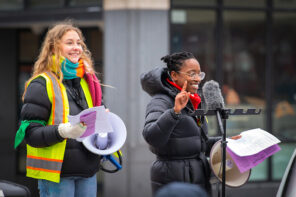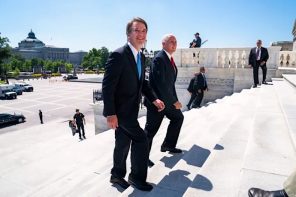At first, in the yonder year of three weeks ago, it seemed that if anything would sink Brett Kavanaugh’s Supreme Court nomination it was his cavalier description of contraceptives as an “abortion-inducing drug” when discussing his dissent from a decision that turned back Priests for Life’s challenge to the contraceptive mandate in the Affordable Care Act.
That, of course, was before Christine Blasey Ford made her bombshell allegation that a beer-stupefied Kavanaugh tried to rape her at a party when they were in high school, Deborah Ramirez alleged that Kavanaugh waved his penis in her face at a drunken dorm party at Yale, and Julie Swetnick released a sworn statement asserting that she witnessed Kavanaugh engaging “in abusive and physically aggressive behavior toward girls.
But the two stories aren’t as disconnected as they seem. Both reveal a specific worldview regarding women and sex and exactly who gets to set the rules regarding the policing of such.
While Kavanaugh was happy to repeat the claim of Priests for Life that certain contraceptives are abortifacients in his initial confirmation hearing, the bigger concern is the sweeping power he was willing to confer to religious entities in his dissent from the majority in the U.S. Court of Appeals for the DC Circuit’s ruling.
The majority held that it was not a substantial burden for Priests for Life to have to fill out a form to be exempt from the contraceptive mandate, contrary to Priests for Life’s assertion that the form itself violated their religious freedom because it would trigger the accommodation by which their insurer would provide contraception to insured women. According to the majority, it was federal law, not the form, that compelled the insurer to provide the coverage.
Kavanaugh, however, agreed with Priests for Life’s assertion, that as Michelle Banker, senior counsel at the National Women’s Law Center, explains it:
…says that the courts had no right to question the religiously-affiliated organizations’ claim that by filling out the form they would be helping women access birth control, even though that belief was based on an incorrect understanding of how the accommodation actually works. To Judge Kavanaugh, even if the religiously-affiliated organizations were “misguided” in thinking that the accommodation made them “complicit” in “wrongdoing,” the courts had no power to second-guess them.
Kavanaugh asserted in his dissent that forcing Priests for Life to fill out the form was exactly the same as a case in which a Muslim prisoner was required to cut off his beard, even though one was obviously a case of an individual being actively required to violate their religious practice while the other was a case of an organization that had already been accommodated as to their religious belief creating ever-more tangential objections to what was merely administrative machinery.
As the majority opinion in the case noted, Kavanaugh’s logic would create “potentially sweeping, new [Religious Freedom Restoration Act] prerogative for religious adherents to make substantial-burden claims based on sincere but erroneous assertions about how federal law works.”
And Kavanaugh’s own dissent makes it clear that he intended to take this one step further. He asserts that as long as Priests for Life’s objection is “sincerely held,” it doesn’t have to be “reasonable” and goes on to greenlight PFL’s assertion that their objection to filling out a form is tantamount to a “religious belief”:
As a matter of religious belief, plaintiffs in this case say that the act of submitting the required form makes them complicit in moral wrongdoing. Importantly, no one here disputes that plaintiffs’ religious belief is sincere and reflects an honest conviction….Therefore, plaintiffs’ decision to decline to submit the required letter or form is an “exercise of religion” under RFRA.
It’s a stunning piece of logic that could open the door to any number opt-outs from civil law as long as objections were “sincerely held” and tangentially related to claims of religious belief. In practice, of course, this would give religious entities such as Priests for Life, the Catholic Church, and their numerous evangelical allies who also filed objections to the contraceptive mandate enormous sway over the reproductive lives of women through their roles as employers and operators of hospitals and universities.
Fast forward to the seemingly incomprehensible insistence of many conservative Republicans to stand by Kavanaugh in the face of mounting sexual assault allegations and to suggest that even if true such allegations are not necessarily disqualifying. But their insistence in standing by a man credibly accused of sexual assault is part and parcel of the exact same mentality displayed in Kavanaugh’s dissent in the Priests for Life case. It’s about who gets to decide the rules when it comes to women and sex. It’s about power.
Thus we see Kavanaugh’s defenders claiming that “boys will be boys,” or, as one Florida Republican woman put it, “[W]e’re talking about a 17-year-old boy in high school with testosterone running high. Tell me, what boy hasn’t done this in high school?”
Both the sweeping religious liberty claims made by conservative forces like Priests for Life and the assertions made by Kavanaugh’s defenders come from exactly the same place: a desire to reassert traditional, patriarchal sexual mores. Under these rules, men can’t be expected to control themselves, but simultaneously get to decide which girls are “good” and which are “bad.” It’s about restoring a world in which the men are in charge—be they priests, bosses, or Supreme Court justices—and get to decide not only what kinds of reproductive healthcare women can get, but who gets raped and who gets believed.




